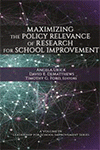
Maximizing the Policy-Relevance of Research for School Improvement
Edited by:
Angela M. Urick, Baylor University
David E. DeMatthews, University of Texas
Timothy G. Ford, The University of Oklahoma
A volume in the series: Leadership for School Improvement. Editor(s): Khalid Arar, Texas State University.
Published 2021
Education policy and policy making is shaped through the activities of a complex network of educators, educational leaders, researchers, community members, as well as government and non-government officials and organizations. Educational researchers are a critical player in this complex network and their investigations of various educational phenomena can answer questions relevant to the design and implementation of education policy for school improvement. Educational research, however, often has limited influence in larger policy conversations and decisions (Orland, 2009), and this is due to many factors. Educational researchers can provide an evidence-based starting place for discussions about school improvement with the complex network of stakeholders engaged in policy development and implementation, but they must be more intentionally and systematically thoughtful about the connections of their work to policy and policy making. Furthermore, researchers can increase the relevance of their work for policy through the careful design and framing of research in collaboration with end-users, and an awareness of its implications. In so doing, researchers can spur the interest and dissemination of their findings to wider audiences. This book offers resources for education researchers, faculty, and advanced graduate students interested in maximizing the relevance of their research on policy for school improvement. In achieving this purpose, the book is organized into three sections: 1) A primer for education policy making in the United States; 2) Designing research to maximize education policy relevance; and 3) Engaging users of research to communicate its relevance to policymakers.
This book is primarily for education researchers, faculty, and advanced graduate students seeking to improve the visibility and impact of their research on school improvement, particularly in the realm of educational policy and policy making. While this book is a volume in the book series for the American Educational Research Association Special Interest Group, Leadership for School Improvement, the importance and usefulness of the topics covered span education research more broadly. Further, the content of this book serves as a comprehensive guide for how education researchers, in general, can better situate their work to influence policy. The book is intended to be utilized by university scholars, graduate students in research or policy courses, post-doctoral fellows, as well as research associates or directors in various organizations relevant to education such as research consulting groups, non-profits which serve education causes, teacher unions, state agencies or state-level educator organizations/associations, and think tanks. Emerging or established researchers in any of these organizations who want to increase the relevance, significance and dissemination of their work into education policy will hopefully find this book useful.
CONTENTS
Acknowledgments. Introduction, Angela Urick, David DeMatthews, and Timothy G. Ford. SECTION I: A PRIMER ON EDUCATION POLICYMAKING IN THE UNITED STATES. The Federal Education Policy Process, Rachel Carly Feldman and Kendrick B. Davis. Actors, Interests, and Actions in Shaping State Education Policy, R. Aaron Wisman and W. Kyle Ingle. SECTION II: DESIGNING RESEARCH TO MAXIMIZE EDUCATION POLICY RELEVANCE. Considerations in the Design of High-Impact Policy-Relevant Research, Tyler Woodward, Alexa Quinn, Sarah Lilly, and Peter A. Youngs. Quantitative Research Design and Education Policy, Pedro Reyes and Michael R. Scott. Qualitative Research Designs for Policy-Relevant Research, Amanda U. Potterton and Joel R. Malin. The Role of Mixed Methods in Increasing the Relevancy of Education Policy Research and Evaluation, Kim Kappler Hewitt and Katherine Cumings Mansfield. The Potential for Improvement Science and Research Partnerships to Maximize Policy Relevance of School Improvement Research, Sarah Winchell Lenhoff, Jeremy Singer, and Ben Pogodzinski. Social Network Analysis for Policy-Relevant Education Research, Yinying Wang. Critical Approaches for Policy-Relevant Research, Derek Houston, T. Jameson Brewer, and Meredith L. Wronowski. “Droppin’ the Mic”: Framing the Implications of Policy-Relevant Research for Maximum Impact, Casey Cobb. SECTION III: ENGAGING USERS OF RESEARCH TO COMMUNICATE ITS RELEVANCE. Communicating to Policymakers, Heather E. Price. Research-Practice Partnerships: An Innovative Approach to School Improvement, Stephen MacGregor and Amanda Cooper. Community Activism and Advocacy, Catharine Biddle and Dana Mitra. Speaking Up and Speaking Out: Editorials as a Means to Shape Public Perceptions and Educational Policy, David DeMatthews, Richard J. Reddick, and Lebon James III. Why We’re Bloggers: Utilizing Blogs and Social Media to Influence Education Policy Conversations and Decisions, Diane Ravitch, Julian Vasquez Helig, and T. Jameson Brewer. Commentary—Reframing Relevance: Strategies for Closing the Gap, Elizabeth Farley-Ripple, Katherine Tilley, Samantha Shewchuk, and Scott Sheridan. About the Authors.
-
Paperback978-1-64802-247-0
Web price: $62.04 (Reg. 72.99)
-
Hardcover978-1-64802-248-7
Web price: $89.24 (Reg. 104.99)
- eBook978-1-64802-249-4

- EDU034000 - EDUCATION: EDUCATIONAL POLICY & REFORM: General
- EDU037000 - EDUCATION: Research
- EDU008000 - EDUCATION: Decision-Making & Problem Solving
-
 Catalytic Improvement Communities
Cultivating Flourishing Schools
Catalytic Improvement Communities
Cultivating Flourishing Schools
-
 Compassionate Leadership for School Improvement and Renewal
Compassionate Leadership for School Improvement and Renewal
-
 Continuous Improvement
A Leadership Process for School Improvement
Continuous Improvement
A Leadership Process for School Improvement
-
 Equity & Access
An Analysis of Educational Leadership Preparation, Policy & Practice
Equity & Access
An Analysis of Educational Leadership Preparation, Policy & Practice
-
 Leadership for School Improvement
Reflection and Renewal
Leadership for School Improvement
Reflection and Renewal
-
 Leveraging Crisis for Equitable School Improvement
Leadership Strategies from the Field
Leveraging Crisis for Equitable School Improvement
Leadership Strategies from the Field
-
 Supporting Leaders for School Improvement Through Self-Care and Wellbeing
Supporting Leaders for School Improvement Through Self-Care and Wellbeing

